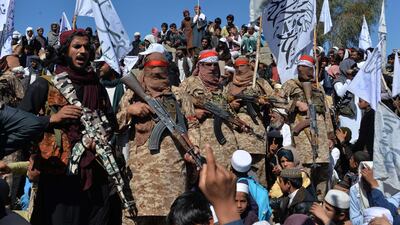The Afghan Taliban are expected to continue co-operating with the US on peace negotiations with the Afghan government despite rejecting US President Joe Biden's decision to withdraw American troops by September, experts say.
US officials said the withdrawal would begin on May 1 – the deadline by which US troops were to have left under a deal agreed to by the insurgents and the Trump administration that paved the way for Taliban participation in peace talks.
All combat forces will leave the country by September 11, Washington said.
The insurgent group responded by withdrawing from talks scheduled to take place in Istanbul on April 24.
Taliban spokesman Muhammad Naeem said the insurgents would not participate "in any conference that shall make decisions about Afghanistan" until foreign forces "completely withdraw from our homeland".
Analysts said the US decision and the Taliban response were expected. The insurgents repeatedly refused to compromise on the May 1 withdrawal date and the Biden administration said on several occasions that the deadline was not feasible.
"American policies are driven by many domestic and international factors," said former Afghan intelligence chief Rahmatullah Nabil.
Moves made by Iran, North Korea, Russia and China "all affect the Americans’ policies in Afghanistan because they feel they are wasting resources and blood in Afghanistan", he said.
But Mr Nabil, does not believe the talks have collapsed entirely. He said the Taliban would try to renegotiate a new deal with the US, with Pakistan acting as mediators.
"Americans want to give concessions to the Taliban in return for extension of the withdrawal timeline,” he said.
Jonathan Schroden, a research programme director at the CNA think tank in the US, shared that view.
"I find it more likely that they will re-engage at some point, because that’s required by the US-Taliban agreement, which remains the path to getting two more things that the Taliban want: the release of the rest of their prisoners and sanctions relief,” he said.
Some Afghan officials expressed relief over the extension of the US deadline because it allows the Afghan government time to employ diplomatic and political tools in the face of flailing talks.
An Afghan official told The National that the government would make the best of the situation.
“It gives the government some more time, but maybe not enough, to build pressure on Taliban and Pakistan to agree to a ceasefire,” the official said.
But Taliban might increase the level of violence in Afghanistan to put pressure on the US and the Afghan government.
"Taliban's actions to date have made quite clear that they see violence as their primary lever for exerting pressure on the government alongside negotiations and I don't see any reason to believe they will change their view on that just because the US is withdrawing," Mr Schroden said.
Mr Nabil said a lack of co-ordination among the Taliban ranks, particularly between the group's armed and political arms, further contributed to the chaos and violence.
Hekmatullah Azamy, deputy director of Centre for Conflict and Peace Studies, said that unlike the previous talks, the Taliban's military office was set to attend the Istanbul meetings alongside its political representatives.
"That was problematic because they are less keen on negotiating and more focused on the continuation of the military aspect of the conflict," he said.
Mr Azamy said many Taliban armed factions believed they had already achieved a military victory with the deal agreed to with the Trump administration last year.
Those factions were unwilling to cede to demands for a ceasefire during peace talks or the extension of the US withdrawal deadline, he said.
But Taliban political negotiators hoped to seek the release of another 7,000 prisoners and the removal of their leaders from a UN blacklist in exchange for an deadline extension of four to six months.
"That was never formally communicated [to the US] earlier, due to this internal friction," Mr Azamy said.
The Taliban's armed wing threatened more violence against US forces if foreign troops remain in the country past the May 1 deadline.
"If the agreement is breached and foreign forces fail to exit our country on the specified date, problems will certainly be compounded and those who failed to comply with the agreement will be held liable," said Zabihullah Mujahid, another spokesman for the insurgents.
But Mr Schroden said he expected the US to react aggressively if the Taliban attacked or seriously threatened US and Nato forces as they withdrew.
“I fear it will get worse before it’s better,” Mr Schroden said.

